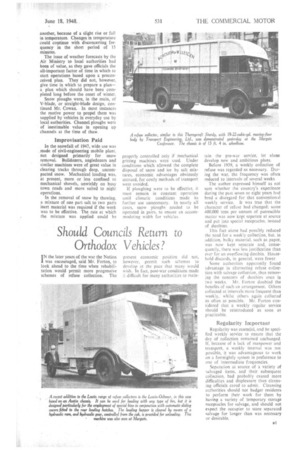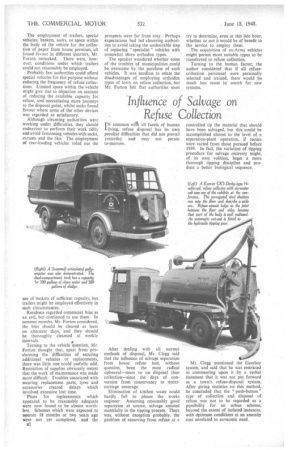Should Councils Return to Orthodox Vehicles?
Page 35

Page 36

If you've noticed an error in this article please click here to report it so we can fix it.
IN the later years of the war the Nation was encouraged, said Mr. Fox-ton, to look ahead to the time when rehabilitation would permit more progressive schemes of refuse collection. The
present economic position did not, however, permit such schemes to develop at the pace that many would wish. In fact, post-war conditions made it difficult for many authorities to main tam n the pre-war service, let alone develop new and ambitious plans.
Before 1939, a weekly collection of refuse was regarded as necessary. During the war, the frequency was often reduced to intervals of several weeks The author expressed himself as not sure whether the country's experience during the past seven or eight years had bred a disregard for that conventional weekly service. It was true that the character of refuse had changed; some 400,000 tons per annum of putrescible matter was now kept separate at source and put into special receptacles, instead of dustbins.
This fact alone had possibly reduced the need for a weekly collection, but. in addition, bulky material, such as paper, was now kept separate and, consequently, there was less justification than ever for art overflowing dustbin. Household discards, in general, were fewer.
Some authorities apparently found advantage in alternating refuse collection with salvage collection, thus removing the contents of dustbins once in two weeks. Mr. Forum doubted the benefits of such an arrangement. Others collected at intervals more frequent than weekly,' whilst others again collected as often as possible. Mr. Forton considered that a weekly regular service should be reintroduced as soon as practicable.
Regularity Important
Regularity was essential, and he specified weekly service to ensure that the day of collection remained unchanged. If, because of a lack of manpower and transport, a weekly interval was not possible, it was advantageous to work on a fortnightly system in preference to one of intermediate frequencies.
Separation at source of a variety of salvaged items, and their subsequent collection, had probably caused more difficulties and displeasure than cleansing officials cared to admit. Cleansing authorities should not badger residents to perform their work for them by having a variety of temporary storage receptacles for salvage, and should not expect the occupier to store separated salvage for longer than was necessary or desirable.
The employment of trailers, special vehicles, baskets, sacks, or space within the body of the vehicle for the collection of paper from house premises, all found favour in different quarters, Mr. Forton remarked. There were, however, conditions under which trailers could not reasonably be employed. Probably few authorities could afford special vehicles for this purpose without reducing the frequency of refuse collections. Limited space within the vehicle might give rise to objection on account of reducing the available capacity for refuse, and necessitating more journeys to the disposal point, whilst sacks found favour where none of the other devices was regarded as satisfactory.
Although cleansing authorities were working under difficulties, they should endeavour to perform their work tidily and avoid festooning vehicles with sacks, cartons and the like. The employment of rear-loading vehicles ruled out the prospects were far from rosy. Perhaps expectations had led cleansing authorities to avoid taking the undesirable step of replacing "specialist" vehicles with somewhat More orthodox types.
The speaker wondered whether some of the troubles of municipalities could be overcome by the purchase of such vehicles. It was needless to relate the disadvantages of employing orthodox types of lorry on refuse collection, but Mr. Forton felt that authorities must try to determine, even at this late hour, whether or not it would be of benefit to the service to employ them.
The acquisition of ex-Army vehicles might permit more suitable types to be transferred to refuse collection.
Turning to the human factor, the author considered that if all refusecollection personnel were personally selected and trained, there would be much less cause to search for new systems.




















































































